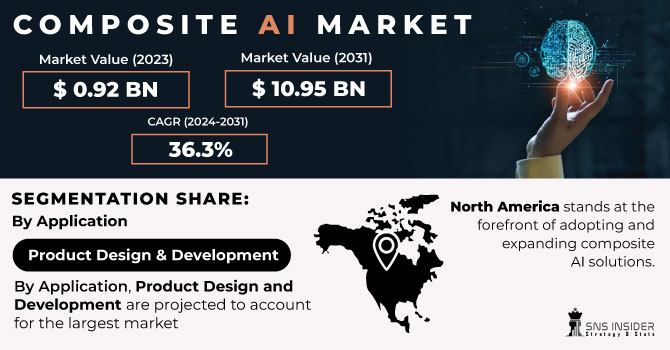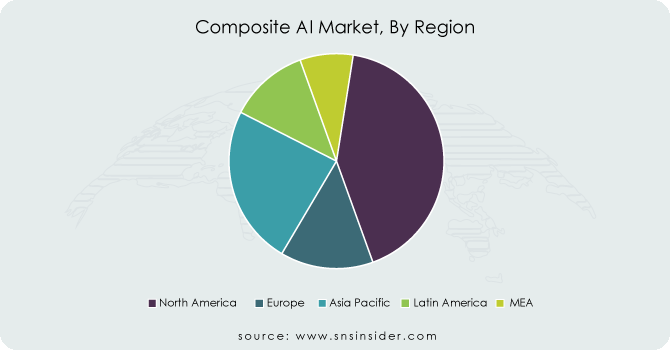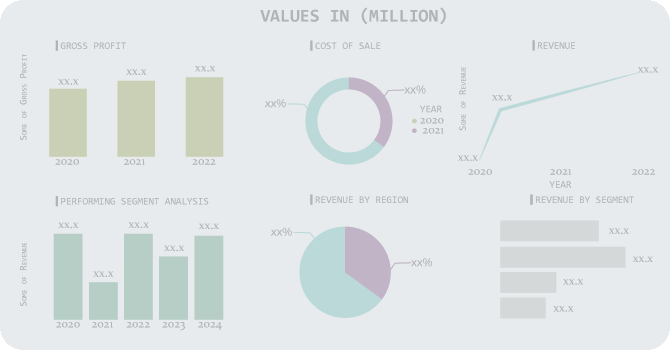Composite AI Market Report Scope & Overview:
The Composite AI Market size was valued at USD 0.95 Billion in 2023 and is expected to grow to USD 15.59 billion by 2032 and grow at a CAGR of 36.46% over the forecast period of 2024-2032.

To Get More Information on Composite AI Market - Request Sample Report
The Composite AI market is growing rapidly as industries recognize the potential of AI systems that integrate multiple techniques to address complex, multi-dimensional problems. By combining methodologies such as machine learning (ML), expert systems, and natural language processing (NLP), Composite AI can overcome the limitations of traditional AI models, enabling more effective decision-making and fostering innovation across various sectors. A key driver of this growth is the increasing complexity of data in industries like healthcare, finance, and manufacturing. These sectors are dealing with vast amounts of structured and unstructured data from multiple sources, and traditional AI systems, which often rely on a single approach, cannot fully meet the demands of such complexity. Composite AI, with its ability to integrate diverse techniques, provides a solution that allows businesses to gain deeper insights and make better-informed decisions. In healthcare, Composite AI is transforming areas such as diagnostics and personalized treatment by combining data from medical records, diagnostic tools, and expert systems, resulting in more accurate and timely patient care. In finance, AI and blockchain technologies are being leveraged to address inefficiencies in the financial system, with AI helping financial institutions tackle over USD 31 trillion in inefficiencies. The automotive sector is also benefiting from Composite AI, particularly in autonomous driving and smart manufacturing.
Market Dynamics:
Drivers
-
Revolutionizing Industries Through Advancements in Composite AI Technologies
Advancements in AI technologies such as deep learning, reinforcement learning, and natural language processing (NLP) are revolutionizing the capabilities of Composite AI, fostering its adoption across diverse industries. Deep learning, a specialized subset of machine learning, empowers AI systems to analyze vast datasets and identify intricate patterns with exceptional precision. By utilizing deep neural networks, Composite AI significantly enhances decision-making in critical applications like image recognition, speech analysis, and predictive analytics, addressing complex challenges beyond the scope of traditional AI models. Reinforcement learning, on the other hand, focuses on teaching AI systems to make optimal decisions through trial-and-error interactions within dynamic environments. This method is particularly impactful in fields like robotics, autonomous systems, and financial modeling. When incorporated into Composite AI frameworks, reinforcement learning introduces adaptability, enabling systems to adjust and improve performance based on real-time feedback. Similarly, NLP plays a pivotal role in enabling machines to comprehend, interpret, and respond to human language with contextual understanding. By integrating NLP with other AI techniques, Composite AI excels in applications such as sentiment analysis, customer service automation, and document processing, enhancing its accuracy and versatility. Collectively, these advancements empower Composite AI to overcome the limitations of single-method AI models by combining diverse approaches for superior outcomes. This makes Composite AI indispensable in industries such as healthcare, finance, and manufacturing, where analyzing and processing diverse datasets is essential. As these technologies advance further, they are expected to broaden the scope and adoption of Composite AI, driving innovation, efficiency, and competitive advantage in the global market.
Restraints
-
Navigating ethical and regulatory challenges in the Composite AI market is essential for ensuring its responsible and effective deployment.
The widespread application of Composite AI across industries like healthcare, finance, and retail introduces significant ethical and regulatory challenges, primarily centered on bias, transparency, accountability, and evolving regulatory frameworks. Bias in AI models is a key concern, as these systems, when trained on incomplete or biased data, can perpetuate unfair outcomes, particularly in sectors like healthcare and finance. The lack of transparency in decision-making processes complicates trust, especially in critical areas where AI’s rationale needs to be clearly understood, such as medical diagnoses and financial recommendations. Accountability is another issue, as it remains unclear who should bear responsibility when AI systems make harmful or erroneous decisions. The absence of standardized regulations for Composite AI means that existing laws, designed without AI’s complexities in mind, often fail to offer adequate guidance. To address these challenges, organizations must implement bias mitigation strategies and explainable AI (XAI) frameworks, while policymakers need to develop clear, comprehensive regulatory guidelines to ensure that Composite AI is used ethically and responsibly.
Segment Analysis:
By Technique
In 2023, the Data Mining & Machine Learning segment captured the largest share of the Composite AI market, accounting for approximately 36% of the total revenue. This dominance can be attributed to the growing reliance on data-driven decision-making across industries. Data mining techniques enable the extraction of valuable insights from large datasets, while machine learning (ML) algorithms improve over time by identifying patterns and making predictions. Together, these technologies form the backbone of many Composite AI applications, enhancing their ability to tackle complex, data-intensive problems. In sectors like healthcare, finance, and retail, data mining and ML are used to optimize operations, predict outcomes, and provide personalized solutions. The combination of these techniques with other AI methodologies like NLP and deep learning enables more accurate and efficient decision-making, driving the adoption of Composite AI systems in various industries. As businesses continue to prioritize data-driven strategies, this segment is poised for sustained growth.
By Offering
In 2023, the software segment captured the largest share of the Composite AI market, accounting for approximately 59% of the total revenue. This dominance is driven by the increasing demand for advanced AI software solutions that integrate multiple AI techniques to deliver more accurate, efficient, and scalable outcomes. Composite AI software combines diverse methodologies such as machine learning, deep learning, natural language processing (NLP), and computer vision, enabling businesses to address complex challenges across various industries. The flexibility and adaptability of AI software make it an essential tool for sectors like healthcare, finance, and retail, where real-time data processing and decision-making are crucial. The software offerings include pre-built AI models, frameworks, and platforms that simplify the deployment and integration of Composite AI technologies. As organizations continue to seek innovative ways to improve operational efficiency, enhance customer experiences, and optimize decision-making, the software segment is expected to maintain a dominant position in the market.
Regional Analysis:
In 2023, North America dominated the Composite AI market, capturing around 40% of the total revenue, with the United States playing a central role in driving this growth. The U.S. remains at the forefront due to its advanced technological infrastructure, large number of AI companies, and significant investments in AI research and development. Major tech hubs like Silicon Valley and cities like Boston and New York continue to foster innovation, making the U.S. a global leader in AI advancements. Canada also contributes significantly, with strong government support for AI research and a growing number of startups utilizing Composite AI in sectors such as healthcare and finance. The Canadian government has invested in AI initiatives, including funding for universities and collaborations between the private and public sectors, promoting the development of AI solutions. The region's dominance is further supported by North America's mature regulatory environment, which encourages the responsible deployment of AI technologies while ensuring ethical standards. Moreover, industries across North America, such as healthcare, finance, and manufacturing, are increasingly adopting Composite AI to improve operational efficiencies, enhance decision-making, and provide better customer service.
In 2023, the Asia-Pacific (APAC) region emerged as the fastest-growing market for Composite AI, propelled by rapid technological advancements, substantial investments in AI research, and widespread adoption of AI across various sectors. Countries such as China, Japan, India, and South Korea are leading this growth, integrating cutting-edge AI technologies like deep learning, natural language processing (NLP), and machine learning into their business operations. China, in particular, is a key driver in the region, investing heavily in AI infrastructure and fostering innovation through government policies aimed at establishing the country as a global AI leader. Major tech companies such as Baidu, Tencent, and Alibaba are leveraging Composite AI to enhance their products and services in industries like e-commerce, healthcare, and smart manufacturing. India is also witnessing rapid growth, with a burgeoning AI landscape and a rising number of startups integrating AI to optimize business processes. The Indian government’s "Digital India" initiative has accelerated the adoption of AI technologies, further boosting the sector’s expansion. Additionally, the APAC region benefits from a large talent pool, lower operational costs, and increasing demand for AI-driven solutions in emerging industries like smart cities, automotive, and healthcare. As these nations continue to prioritize AI development and invest in AI technologies, the Asia-Pacific region is set to sustain its position as the fastest-growing and most dynamic market for Composite AI.

Do You Need any Customization Research on Composite AI Market - Enquire Now
Key Players:
Some of the Major Players in Composite AI Market with Product:
-
IBM (Watson AI, IBM Cloud Pak for Data)
-
Microsoft (Azure AI, Azure Machine Learning)
-
Google (Alphabet) (Google AI, TensorFlow)
-
Amazon Web Services (AWS) (AWS AI, AWS SageMaker)
-
Intel (Nervana AI, Intel AI Processors)
-
NVIDIA (NVIDIA AI Platform, DGX Systems)
-
SAP (SAP Leonardo, SAP Cloud Platform AI)
-
Oracle (Oracle Cloud AI, Oracle Autonomous Database)
-
Salesforce (Einstein AI)
-
Siemens (MindSphere, Siemens AI)
-
Hewlett Packard Enterprise (HPE) (HPE AI, HPE Ezmeral)
-
Baidu (Apollo AI, Baidu AI Cloud)
-
Accenture (Accenture AI, myNav AI)
-
Cognizant (Cognizant AI, Cognizant Cloud AI)
-
Qualcomm (Qualcomm AI Engine, Snapdragon AI Platform)
-
Palantir Technologies (Palantir Foundry, Palantir AI)
-
Dell Technologies (Dell Technologies AI Solutions)
-
KPMG (KPMG AI Solutions, Ignite AI)
-
Alibaba Cloud (Alibaba Cloud AI, PAI Studio)
-
Zebra Medical Vision (AI-powered diagnostic tools)
List of companies that are potential customers in the Composite AI Market, spanning various industries:
Automotive Industry
-
Toyota
-
Ford Motor Company
-
Volkswagen
-
Waymo (Google)
-
Tesla
-
General Motors (Cruise)
Healthcare and Life Sciences
-
Mayo Clinic
-
Johns Hopkins Medicine
-
Cleveland Clinic
-
Pfizer
-
Merck & Co.
-
Johnson & Johnson
Financial Services and Banking
-
JPMorgan Chase
-
Goldman Sachs
-
HSBC
-
Citigroup
-
Allianz
-
State Farm Insurance
Manufacturing and Industrial
-
General Electric (GE)
-
Siemens
-
Honeywell International
-
ABB
-
Schneider Electric
-
Rockwell Automation
Telecommunications
-
AT&T
-
Verizon
-
T-Mobile
-
Huawei
-
Ericsson
-
Nokia
Retail and E-commerce
-
Amazon
-
Alibaba Group
-
Walmart
-
Target Corporation
-
Best Buy
-
Home Depot
Energy and Utilities
-
ExxonMobil
-
Shell
-
BP
-
Tesla (Solar)
-
NextEra Energy
-
Vestas
Government and Defense
-
Lockheed Martin
-
Northrop Grumman
-
Raytheon Technologies
-
NASA
-
DARPA
-
FBI
Google-Company Financial Analysis

Recent Development:
-
August 5, 2024: The Dow Jones Industrial Average plunged by 1,200 points, or 3%, amid a broader stock market sell-off. Nvidia's stock dropped significantly following reports of delays in its next-generation Blackwell AI chips due to a design flaw.
-
May 25, 2024: Nvidia, TSMC, Broadcom, and Qualcomm are set to lead a trillion-dollar silicon boom, with advancements in AI driving unprecedented growth. These companies are expected to capture nearly half of the USD 1 trillion opportunity in the semiconductor industry this decade, reshaping the market landscape.
| Report Attributes | Details |
|---|---|
| Market Size in 2023 | USD 0.95 Billion |
| Market Size by 2032 | USD 15.59 Billion |
| CAGR | CAGR of 36.46% From 2024 to 2032 |
| Base Year | 2023 |
| Forecast Period | 2024-2032 |
| Historical Data | 2020-2022 |
| Report Scope & Coverage | Market Size, Segments Analysis, Competitive Landscape, Regional Analysis, DROC & SWOT Analysis, Forecast Outlook |
| Key Segments | • By Technique (Conditioned Monitoring, Pattern Recognition, Data Processing, Proactive Mechanism, Data Mining & Machine Learning, Others) • By Offering (Hardware, Software, Service) • By Application (Product Design & Development, Quality Control, Predictive Maintenance, Security & Surveillance, Customer Service, Other) • By Industry Vertical (BFSI, Retail and eCommerce, Manufacturing, Energy and Utilities, Transportation and Logistics, Healthcare and Life Sciences, Media and Entertainment, Government and Defense, Telecom, Other) |
| Regional Analysis/Coverage | North America (US, Canada, Mexico), Europe (Eastern Europe [Poland, Romania, Hungary, Turkey, Rest of Eastern Europe] Western Europe] Germany, France, UK, Italy, Spain, Netherlands, Switzerland, Austria, Rest of Western Europe]), Asia Pacific (China, India, Japan, South Korea, Vietnam, Singapore, Australia, Rest of Asia Pacific), Middle East & Africa (Middle East [UAE, Egypt, Saudi Arabia, Qatar, Rest of Middle East], Africa [Nigeria, South Africa, Rest of Africa], Latin America (Brazil, Argentina, Colombia, Rest of Latin America) |
| Company Profiles | IBM, Microsoft, Google, Amazon Web Services, Intel, NVIDIA, SAP, Oracle, Salesforce, Siemens, Hewlett Packard Enterprise, Baidu, Accenture, Cognizant, Qualcomm, Palantir Technologies, Dell Technologies, KPMG, Alibaba Cloud, and Zebra Medical Vision are all key players in the AI and cloud computing space, offering a range of advanced solutions for businesses across various industries. |
| Key Drivers | • Revolutionizing Industries Through Advancements in Composite AI Technologies |
| Restraints | • Navigating ethical and regulatory challenges in the Composite AI market is essential for ensuring its responsible and effective deployment. |

